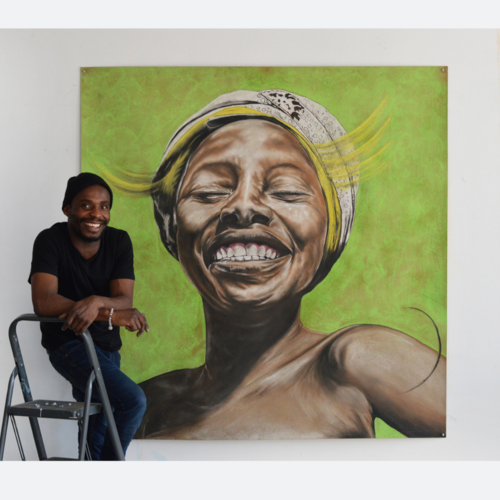Lloyd Maluleke

Lloyd Maluleke is a Limpopo-born, Johannesburg-based professional printer and artist exploring the theme of absent parentage from an unexpectedly positive and whimsical perspective. His practice delves into the emotional complexity of growing up without a father, but instead of approaching it from a standpoint of victimhood, Maluleke’s work invites viewers to see the world through the eyes of a child who, despite the absence, holds an idealized view of the missing parent.
Maluleke's personal experience as one of many South African children raised without a father due to the pressures of migration for work, particularly to the city, forms the foundation of his artistic approach. His mother, who explained this situation to him in a nurturing and non-bitter way, greatly influenced his understanding of absent parentage. She taught him that the community plays an integral role in shaping who a child becomes, a theme which Maluleke explores in his art.
His prints often depict children wearing brightly colored hardhats or carrying shovels. These symbols are not to be understood as signs of child labor, but rather as visual representations of a child’s perception of a father figure who is off to the city to build a better life for his family. The vibrant yellow hardhats contrast with the muted tones of the figures and backgrounds, highlighting the larger-than-life image a child might hold of an absent parent. This whimsical approach captures the imagination of a child who idealizes his father’s role as a provider, while simultaneously acknowledging the significant role mothers and guardians play in shaping a child’s worldview.
In contrast, Maluleke uses similar imagery of hardhats and shovels when depicting women in his prints, but here the symbolism shifts. The women, who are often left behind to shoulder the daily responsibilities of supporting the family, embody a more grounded, realistic interpretation of strength. The hardhats and shovels now represent the heavy, literal burden that these women carry, giving the work a deeper emotional resonance.
Maluleke’s work is a powerful reminder of how the narratives we grow up with, especially those shaped by caregivers, can profoundly affect how we perceive absence, strength, and resilience. His art speaks to the importance of community, the power of positivity, and the strength of the human spirit, all while addressing the complex issue of fatherlessness with both empathy and lightheartedness.
Read More









